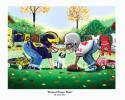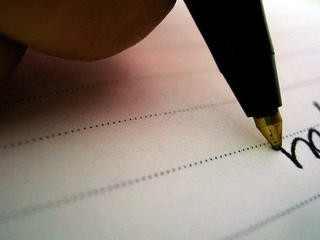I feel almost naked in posting this. I have never before shared a real turned-in paper from school. This one originates from a political theory class. For lack of a better phrase, I stumbled upon it while cleaning up hard drive space in my computer. The essay circumvents issues of religion, power, and government by comparing Marx and Rousseau and will therefore serve as an appropriate catalyst for future writings concerning the origins of man and society. But in itself, the essay offers understandable summaries of some of Rousseau’s and Marx’s most interesting (and famous) thoughts. Enjoy…
From the Ground Up
There are inevitably changes in society, sometimes these changes overlap, sometimes they are abrupt and independent of one another, and some changes are at an ambiguous point in between the two extremes. But why in fact are there changes in society and to what cause do they offer their thanks? Are these changes inevitable or a cause of some unnatural development of man? And arguably most importantly, is the present state of society changeable? These seemingly unanswerable questions are precisely what motivate Marx and Rousseau to carry out their intellectual quest to find the past, present, and future state of man. Rousseau and Marx at surface level have largely different views on how society evolves, but with more careful consideration of Marx’s argument concerning capitalism and Rousseau’s views about the origination of inequality, striking similarities concerning their opinions on the future of man will show themselves.
Firstly, Rousseau’s Origin’s of Inequality will be discussed, specifically, his opinions about the evolution of society to its present state and how this present state is unnatural and needs be changed. Secondly, Marx’s views about capitalism will be used to further understand his theory of societal evolution. The two will then be compared by, 1) recognizing their different views about the cause of societal change, and some similarities, and 2) finding similarities in their conclusions. Lastly, Rousseau’s Social Contract will be shown to be in agreement with Marx.
Rousseau’s idea about the development of society and inevitably, government and law, could be arranged many different ways, and it is not necessary to strictly define the “levels” or stages for this discussion. Therefore, a simple understanding of the evolution from the very animalistic man to the complex nature of him will be sufficient.
“I see an animal less strong than some, less agile than others, but all in all, the most advantageously organized of all,” says Rousseau. This is a key note; Rousseau believes whole heartedly that man was at his best when he was at the very beginning of his development. This state is the most natural, and any following development therefore, went “against nature.” In this beginning, Rousseau says that people have certain basic functions: perceiving, feeling, willing, desiring, fearing, and pitying” People do not have language per-say. They have no need for social relations. At the simplest sense, they have basic desires and whether instinctual or through cognitive thought, they fulfill those desires, such as eating, sleeping, and procreating. They are the closest form to a contemporary definition of a savage.
Eventually though, humans start to accumulate desire satisfying commodities like food. Because they have this new idea of a “possession” they start to have a need to protect those possessions and means to satisfy their desires more efficiently. As is stated in the Discourse, “difficulties soon presented themselves to him (man); it was necessary to learn to overcome them.”
Eventually, to overcome many of these difficulties, men found it necessary, in some instances, to come together; “He united with them in a herd, or at most in some sort of free association, that obligated no one and that lasted only as long as the passing need that had formed it.” This bonding together to help each man individually, eventually was seen as more and more useful and thus, happened more often. As time progressed and men coming together for common interests became frequent, language evolved, and primitive forms of technology, or in the least sense, cooperation, were created. “These first advances enabled man to make more rapid ones. The more the mind was enlightened, the more industry was perfected.”
Again, with time, these bonds grew stronger and the sense of community grew more distinct, and most importantly, organization was created. Some people would say, fish, and others would build shelter. Soon then, because certain people’s “jobs” were seen as more important or more skillful, there became some sense of “esteem” or a simplistic level of hierarchy if you will. For example, Rousseau writes, “…each man punished the contempt shown him in a manner proportionate to the esteem in which he held himself; acts of revenge became terrible and men became bloodthirsty and cruel.” Now this new sense of revenge, and terrible acts, gives way for fear. Because of this fear, there are laws set forth.
So now it is fairly easy to see how this new form of interaction led itself to our modern state of affairs. Certain men had more power in these hierarchy’s then others, and for this very reason, men (and woman of course, but for clarity “men” will be assumed to include woman) put themselves underneath under men for possible gains, such as food and protection. But these “protectors” and “providers” soon became seduced by power and wealth. People surrendered to fraudulent contracts that did not benefit them proportionally to the benefit gained by the man in power. In earnest, it was/is a sorry state of affairs.
Marx, as was previously mentioned, on the surface, creates a much different picture of man’s development. For now, I will paint that picture as its basic level. Every modern view of society and politics is a result of economics. Marx puts it this way when critiquing political economy, “It expresses abstract formulae the material process through which private property actually passes, and these formulae it then takes for laws. It does not comprehend these laws—i.e., it does not demonstrate how they arise from the very nature of private property.” His end result is then, that all laws are formed because of private property. The questions are, who has what, how much do they have, and how can they keep it?
These fundamentals bind human development into differing governments and different economic forms. For example, at the very beginning, people did not “own” anything, they merely lived. But as possessions grew, so did power. The person with the most possessions had the most power, and set up institutions that would justify his or her having more than everyone else. Then, as possessions change hands, ideas are changed resultantly.
So, as soon as possessions became important, and the already discussed capitalistic state was created as a result, a democracy, in one sense or the other, fits. How can there be a dictatorship and capitalism, there would be too many complications for it to be feasible. For example, if the dictator decided that a certain person shouldn’t have as much as he does, then the institution set up by the dictatorship would ensure the end result being, the person won’t have as much. This is contradictory to the very nature of capitalism: that each man, through trade and property, can have as much as he can produce (buy). In basic, because capitalism arises, democracy, naturally arises. This is consistent with Marx’s basic idea that the economic system, changes the ideas of the people, and ultimately, the governmental system. It could be inferred that Marx’s ultimate goal would be a perfect communist state, because that would parallel (fit with) a more fair and equal economic state, where humans are not objectified or alienated, they all create equally and consume equally.
As was previously mentioned, then, at the basic level, it seems as though Rousseau’s idea about the development of society is based on natural inevitabilities, or more specifically, man’s wants and needs growing. Marx then, says society changes as a result of economic changes, or more specifically, how possessions (power) change hands. But if Rousseau’s theory of development is more strictly scrutinized, it will become apparent that many of the evolutions which caused societal changes, in Rousseau’s eyes, were the result of possession changes. This new thought, will then lend itself to make Rousseau’s original “natural” evolution to look quite similar to Marx’s economic development.
From the very first stage of human nature, the savage like state, Rousseau describes the change as follows, “The first person who, having enclosed a plot of land, took it into his head to say this is mine and found people simple enough to believe him, was the true founder of civil society.” This is much the same as Marx’s theory about capitalism. That once capitalism began, humans become objects of a society, rather than individuals (became part of a pack instead of an individual savage). So the very start of the change from savage to group was made based on possession (plot of land). Then, because in this previously discussed time when man was coming together, “since the strongest were probably first to make themselves lodgings they felt capable of defending presumably the weak found it quicker and safer to imitate then to try and dislodge them.” Then, after these hierarchies were set up, Rousseau writes
“It was to use in his favor the very strength of those who attacked him to turn his adversaries into his defenders…let us institute rules of justice and peace to which all will be obliged to conform, which will make special exceptions for no one.”
As it is clear to see, because certain people had more or less possessions, they had esteem or power in these communities, then, because they found it better to have the lesser people on their side, they created this fraudulent contracts, where it would seem that everyone was equal, or at least had the possibility of becoming equal (capitalism), whereby they would gain even more power and control. This is exactly reminiscent of Marx’s view that the original possessors created rules (and religions) just to help themselves maintain their power. Rousseau doesn’t base development on economies, but, he does base it on needs, and what are needs if not possessions? The similarities are intrinsic.



